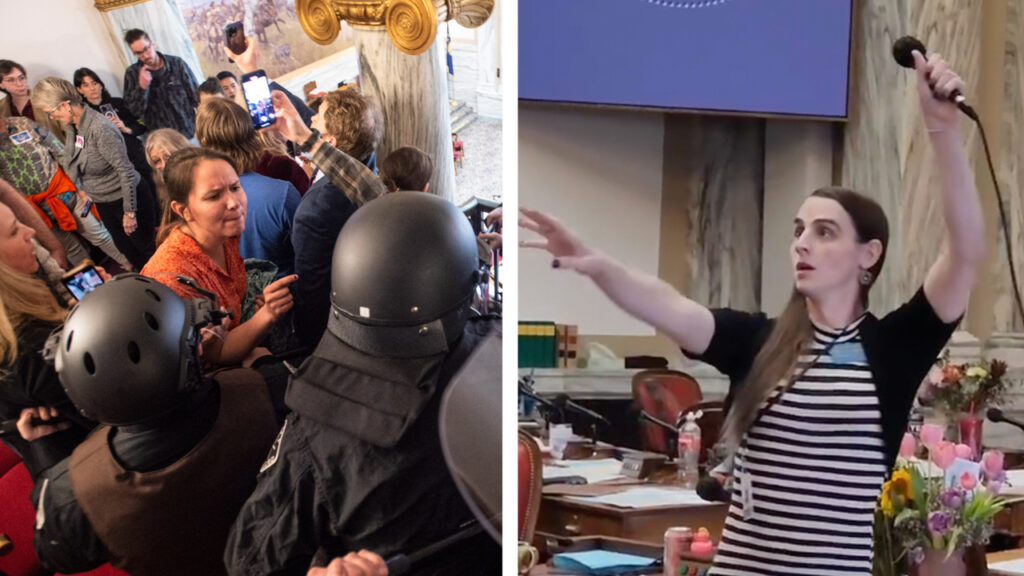Law enforcement escorted Zephyr’s supporters from the gallery above the House floor, including several by force. Seven were arrested for criminal trespass, the sheriff said. They were going to be booked and released.
The disruption drew the ire of Republican leaders, who described it as a “riot” and an “insurrection.”
Leaders cut the sound on the video feed, and Zephyr remained on the floor holding her microphone as supporters also chanted “Whose House? Our House!” The sergeant-at-arms asked Zephyr to help settle things down — a request he said she rebuffed.
Zephyr did not return the the floor after lawmakers reconvened. She told The Associated Press she was headed to the county jail with the protesters who were arrested. She tweeted that she went there to show “support for those who were arrested defending democracy.”
Supporters of the ban saw Zephyr’s admonishment as unprecedented and personal, yet most have refrained from commenting publicly.
House leadership declined to comment to journalists Monday but released a statement saying they “condemn violence and will always stand for civil debate and respect for our processes of government.”
“Today’s riot by far-left agitators damages our discourse and endangered legislators and staff. Their actions did not represent Montana values,” House Speaker Matt Regier, Speaker pro tempore Rhonda Knudsen and Majority Leader Sue Vinton said in the statement.
The conservative Montana Freedom Caucus, which called for Zephyr to be censured after her comments last week, issued a statement condemning the actions of “the violent protesters” in the Capitol. It said a small minority of people disrupted the legislature’s business, showing “why we must enforce the rules of decorum when engaged in public debate.”
“Zephyr encouraged these actions by standing in the middle of the floor encouraging an insurrection after all members were told to move to the sides,” and people in the gallery were told to leave. The caucus, which includes 21 of the legislature’s 102 Republican lawmakers called for immediate disciplinary action against Zephyr.
Zephyr and her supporters say her statements accurately illustrate the stakes of the legislation under discussion, arguing that restricting gender-affirming care endangers transgender youth, who studies suggest are at greater risk of depression and suicide.
Earlier in the day, Zephyr spoke from the Capitol steps, telling supporters that she planned to continue speaking forcefully against legislation that members of the transgender community, including herself, consider matters of life and death.
“I was sent here to speak on behalf of my constituents and to speak on behalf of my community. It’s the promise I made when I got elected, and it’s a promise that I will continue to keep every single day,” Zephyr said.
She also connected the transgender community’s struggle against gender-affirming care bans to political fights animating other marginalized groups throughout the United States.
“When those communities who see the repercussions of those bills have the audacity to stand up and say, ‘This legislation gets us killed,’ those in power aren’t content with just passing those hateful, harmful bills,” she said. “What they are demanding is silence. We will not be complicit in our eradication,” she said.
Those gathered held signs of support, cheered and waved Pride flags.
After the rally, a 21-year-old teared up as he told Zephyr about his fears of coming out as transgender in his a small town in southwestern Montana. Others hugged the lawmaker, thanked her for fighting and apologized for the fact that she had to do so.
Katy Spence, a constituent who drove in from Missoula, said the standoff was about censoring ideas, not decorum.
“She’s been silenced because she spoke the truth about what these anti-trans bills are doing in Montana — to trans youth especially,” Spence said.
The standoff is the latest example of emergent discussions around civility, decorum and how to discuss political issues many perceive as life and death.
Zephyr was silenced and deliberately misgendered by some Republican lawmakers in response to her charge last week. Republican leaders have demanded she apologize and said they won’t let any lawmaker speak whom they don’t trust to uphold decorum — regardless of party or gender. Misgendering is using pronouns that do not match a person’s gender identity.
Months after Zephyr became the first openly transgender woman elected to the Montana Legislature, the state joined a long list of legislatures passing new restrictions on transgender children. Proposals this year have addressed issues ranging from the health care they can access to the sports teams they can play on to the names they can go by.
Though proceedings have been heated in more than a dozen statehouses, Republican efforts to keep Zephyr from speaking have given such legislative battles newfound attention.
Lawmakers passed the gender-affirming care ban last week, and Gianforte has indicated he will sign it.
The American Civil Liberties Union and Lambda Legal have vowed to challenge it in court before it takes effect in October.


